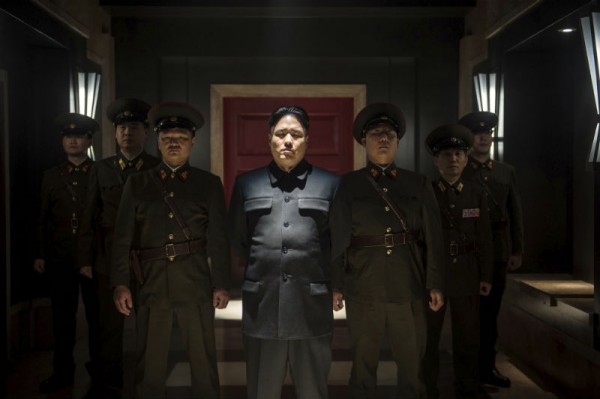Movie world fears for freedom of speech after cancellation of ‘The Interview’

In this undated photo provided by Columbia Pictures – Sony, Actor Randall Park, center, portrays North Korean leader Kim Jong Un in Columbia Pictures’ “The Interview.” AP
PARIS, France–Sony Pictures’ decision to cancel the release of its madcap comedy about North Korea after threats from hackers has caused consternation in the movie world and triggered concerns about freedom of expression.
“The Interview,” starring James Franco and Seth Rogen and depicting a fictional plot to assassinate North Korean dictator Kim Jong-Un, had been due to hit US cinemas on December 25.
But after warnings from the so-called GOP (Guardians of Peace) hacking group — invoking the September 11, 2001 attacks — a number of US cinema chains canceled plans to screen the film.
As more chains confirmed they would follow suit, Sony on Wednesday threw in the towel and pulled the film, in a decision described by former long-time Cannes Film Festival president Gilles Jacob as “onerous… both for the studio and freedom of expression”.
Movie world figures said the fate of “The Interview” was unparalleled and set a dangerous precedent, pointing out that even Martin Scorsese’s “The Last Temptation of Christ” (1988), which sparked demonstrations in the US, was still shown.
Article continues after this advertisement“It is very rare that a planned release is cancelled. And in general it’s because of a conflict between the director, the producer and the studio,” Marc Missonnier, president of the French Association of Cinema Producers, said.
Article continues after this advertisementSony’s decision came hard on the heels of an embarrassing November 24 cyber-attack that saw hackers gain access to a trove of internal Sony documents and unreleased movies.
Investigators reportedly believe the attack was masterminded by North Korea.
The country’s top military body has denied this but added that it might have been a “righteous deed” carried out by supporters.
Best-selling writer Stephen King and Hollywood actors and directors reacted with dismay at Sony’s decision, with some accusing Sony of caving in.
“Sony’s decision to pull ‘The Interview’ is unsettling in so many ways. Good thing they don’t publish the Satanic Verses,” King wrote on Twitter.
“Will they pull any movie that gets an anonymous threat now?” tweeted “Bridesmaids” producer Judd Apatow.
‘Everyone caved’
“Wow. Everyone caved. The hackers won. An utter and complete victory for them. Wow,” actor Rob Lowe, who has a small cameo role in the film, said.
Others said the decision had important implications for freedom of speech.
“I am sympathetic with Sony and I am sympathetic with any theater that worries about damage and injury and worse involving its staff and its customers,” Richard Walter of the UCLA Film School told Agence France-Presse.
“But on the other hand I have to say there is something, for an American and for anybody who loves freedom, that viscerally rebels against surrendering to terror this way,” he added.
“The single most disturbing aspect of this whole case it the notion that studios might cave, might surrender to lunatics of the political fringe in terms of what movies they make and what movies they release.”
The US State Department meanwhile sought to distance itself from the film, while defending the right to free expression.
“We’re not in the business of signing off on the content of movies or things along those lines,” spokeswoman Jen Psaki said, while President Barack Obama said there was “no credible evidence” of any threats linked to movie theaters.
“For now, my recommendation would be: Go to the movies,” Obama told ABC News.
Missonnier, however, was more sympathetic to Sony’s dilemma.
“A US studio, it’s a commercial business, which is not there to defend the grand principles of freedom. They believe that the cost will be too high,” he said.
As for the film, according to Jacob anyone wishing to see it is not likely to be disappointed as it “will probably come out on the Internet” sooner or later.
And while that might satisfy some concerned about freedom of speech, it is unlikely to compensate Sony for its costs.
RELATED STORY
Sony cancels release of comedy on N. Korean head Kim Jung-un